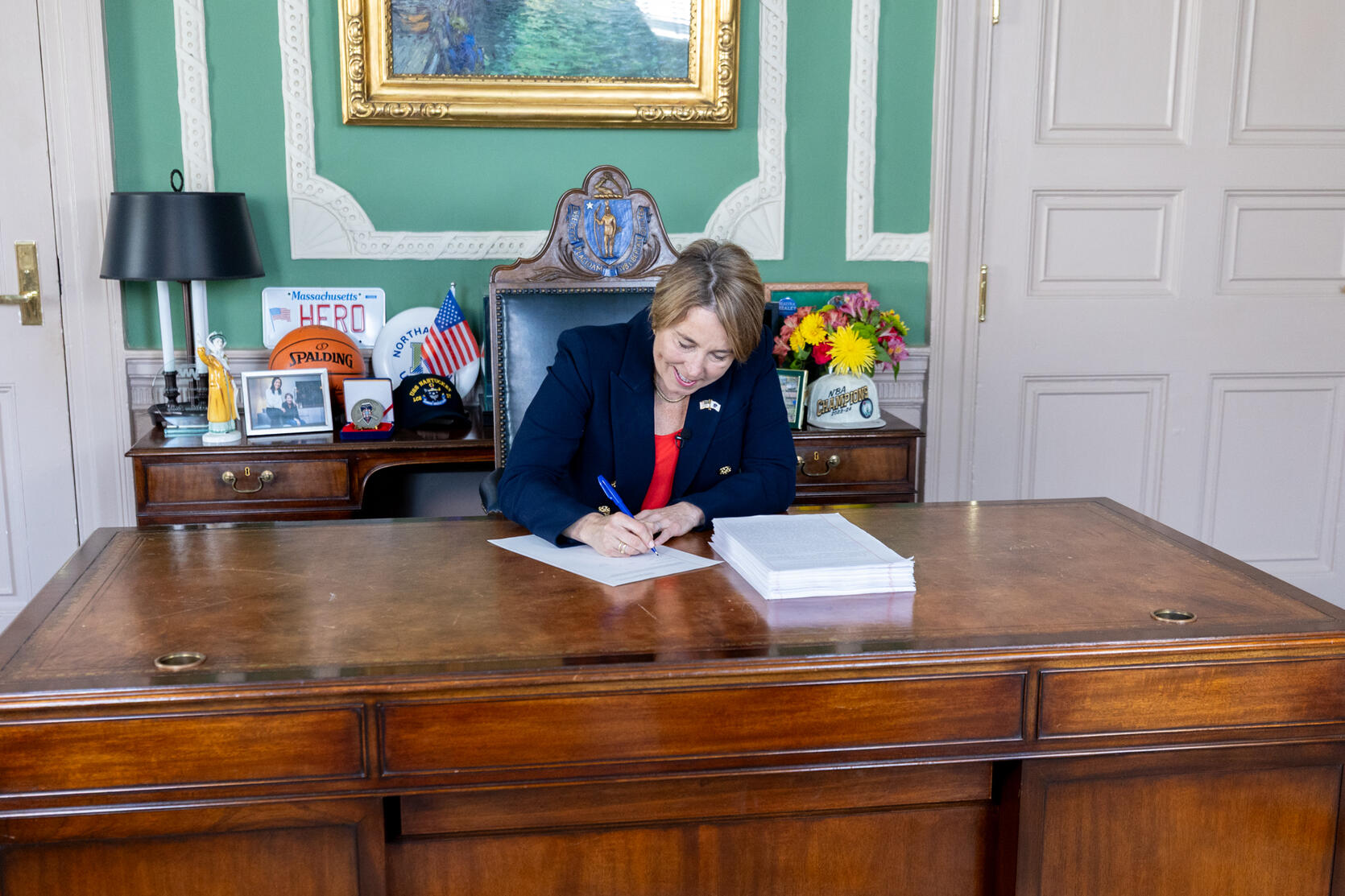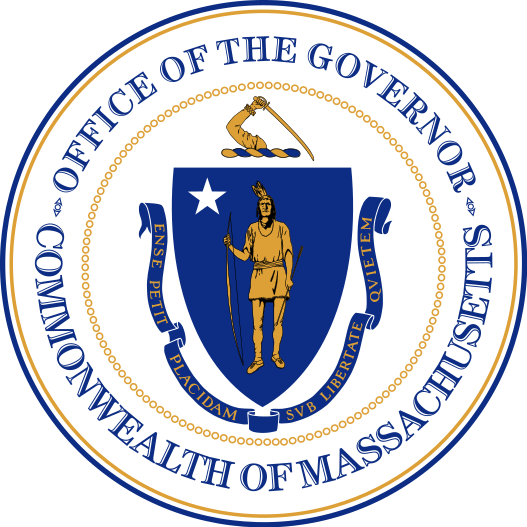- Governor Maura Healey and Lt. Governor Kim Driscoll
- Executive Office for Administration and Finance
Media Contact
Karissa Hand, Press Secretary

Boston — Today, Governor Maura Healey signed the Fiscal Year 2026 (FY26) state budget, a $60.9 billion plan that is fiscally responsible, lowers costs, protects essential care and services, and moves the Massachusetts economy forward.
To further control spending and protect taxpayer dollars, Governor Healey is vetoing $130 million, resulting in a final budget that is more than $1 billion less than the H1 proposal and $130 million less than the final conference budget. The administration is also continuing an Executive Branch hiring freeze, halting a planned non-union manager pay raise scheduled for January, saving $17 million, and delaying payment on earmarked funds for local projects in the budget totaling approximately $125 million until later in the year when more is understood about their affordability.
“I’m proud to sign a budget that is fiscally responsible and protects what makes Massachusetts special,” said Governor Healey. “I’m grateful to the Legislature for their strong partnership and efficient work to develop and pass this budget for the people we serve. In Massachusetts, we are continuing to lead and do what we know works – focusing on lowering costs, protecting essential care and services, and moving our economy forward by investing in housing, transportation and our schools. We are also signing this budget in a moment of great dysfunction in Washington. The President is poised to sign a bill that’s going to kick hundreds of thousands of Massachusetts residents off their health care, increase energy and groceries prices, and cost people their jobs.”
“This is a fiscally responsible budget that will make Massachusetts more affordable,” said Lieutenant Governor Kim Driscoll. “It saves renters thousands of dollars by eliminating broker’s fees, makes regional transit free, keeps community college cost-free, increases financial aid at state schools, makes it easier to find child care and protects free school meals.”
The FY26 budget extends the Healey-Driscoll Administration's successful initiatives to make housing, transportation and education more affordable by funding universal free school meals, free community college and fare-free regional transit. The budget lowers child care costs for families—with $475 million in support for Commonwealth Cares for Children (C3) to early education and care providers—and alleviates financial pressure on college students by providing an $85 million expansion of scholarships through the MASSGrant Plus financial aid program. The budget also codifies Governor Healey’s proposal to drive down housing costs by banning renter-paid broker’s fees, and extends the ConnectorCare expansion pilot program, which increases access to affordable health care.
The budget spends $2.4 billion in revenues in FY26 from the voter-approved Fair Share surtax, which the Healey-Driscoll Administration is deploying to make transformative, strategic investments in transportation and education. Initiatives that will be funded by Fair Share in FY26 include MassEducate, the MBTA’s Income-Eligible Fare Relief program, and regional transit grants.
The FY26 budget makes additional strategic investments in schools, ensuring that Massachusetts continues to have the best education system and the most highly-trained workforce in the country. The budget fully funds the fifth-year implementation of the Student Opportunity Act, with $7.362 billion in Chapter 70 education aid. This is a $460 million, or 7 percent, increase from FY25, and provides a historic minimum per pupil aid rate of $150. The budget also provides continued support for the Administration’s Literacy Launch Initiative (funded at $15 million), a transformative plan to improve early literacy education and ensure students receive the highest quality, evidence-based reading instruction available.
The FY26 budget delivers on Governor Healey’s historic plan to invest $8 billion over the next 10 years in the state’s roads, bridges and public transportation. Through this budget and the $1.3 billion supplemental budget that Governor Healey signed in June 2025, the Administration is stabilizing the MBTA’s operations and maximizing the benefits of the Fair Share surtax. Specifically, the Administration’s FY26 budget includes a transfer of $550 million in Fair Share funds to the Commonwealth Transportation Fund (CTF), to leverage over $5 billion in borrowing for transportation infrastructure.
“In Massachusetts, we know that the best investment we can make is in our people, and this budget reflects the Senate’s continuing commitment to do so while maintaining our equal commitment to responsible money management,” said Senate President Karen E. Spilka (D-Ashland). “This statewide approach to investment delivers resources to every part of the state and protects our most vulnerable residents from the cruelest actions of the federal government, while our continued focus on education and mental health ensures that people have they keys to unlock the doors of opportunity. I am grateful to Governor Healey for her signature, each Senator for their contributions to this budget, to Chair Rodrigues, and to our partners in the House for their commitment to shaping the state’s investments in our collective future.”
“This FY26 budget makes key investments that better support Massachusetts students and families, that increase access to affordable health care, and that provide for a safer and more reliable public transportation system – all without raising taxes. In a moment of incredible uncertainty at the federal level, this budget is proof that government can be both fiscally responsible and an agent of good, the kind of government that our residents deserve,” said House Speaker Ronald J. Mariano (D-Quincy). “I want to thank Governor Healey and her team, Chairman Michlewitz and my colleagues in the House, as well as our partners in the Senate for working diligently to craft a budget that delivers for our constituents without jeopardizing the Commonwealth’s long term fiscal stability.”
“Despite a fiscally challenging environment, this budget continues to advance the Healey-Driscoll Administration's priorities, including making Massachusetts more affordable, driving growth, and maximizing resources--particularly Fair Share revenues--to make transformative improvements to our transportation and education systems," said Administration and Finance Secretary Matthew J. Gorzkowicz. "This budget also takes proactive steps to make sure Massachusetts is prepared to confront an uncertain economic future. I'm grateful for the partnership of my colleagues in the Legislature, and I look forward to continuing to work with them as we manage through FY26."
Alongside the budget, Governor Healey filed a supplemental budget that includes $100 million for FY26 to provide a flexible pool of resources to quickly respond to changing economic conditions and federal spending decisions that will arise over the course of the year. Some of this money can be used for Department of Transitional Assistance caseworkers. The supplemental budget also includes a transfer of $30 million to the Housing Preservation and Stabilization Trust Fund and gives Governor Healey expanded emergency budget cutting (9c) authority and line-item transferability that will help the Administration navigate economic uncertainty.
The $130 million in vetoed spending includes, among other items, $27.5 million for the Group Insurance Commission by reining in the high cost of covering GLP-1 weight-loss drugs. Governor Healey is directing GIC to approve a mid-year health insurance plan change for state employees to eliminate coverage in all cases except when medically necessary, such as for patients with diabetes. This will bring health plans offered to state employees more in line with what is being offered in the private market, and the Governor urges the Commission to support this change.
Governor Healey is also signing 130 of the 134 budget outside sections, including the provision she introduced in her FY26 proposed budget (H.1) to end renter-paid brokers fees.
The Governor’s signing letter, veto message, and returns will soon be available at this link.
FY26 Budget Highlights
Fair Share
- $1.5 billion for education
- $266 million for higher education, including $96 million for Mass Educate to build upon the success of Mass Reconnect and make community free for all, and $85 million for MassGrant Plus financial aid scholarships
- $759.9 million for K-12 education, including $180 million for access to free school meals for students across the Commonwealth and $15 million for Literacy Launch
- $469.2 million for early education and care, including $93.7 million for child care financial assistance and $360 million to help support the C3 program
- $711.9 million for transportation
- $550 million of Fair Share revenue dedicated to the Commonwealth Transportation Fund, which will leverage over $5 billion in borrowing for transformative infrastructure investments
- $470 million operating support to stabilize the MBTA
- $115 million for regional transit grants
- $35 million for income-eligible reduced fares at RTAs
Education and Local Aid
- Fully funds the Student Opportunity Act with $7.36 billion for Chapter 70 funding, a 7 percent increase over FY25
- $150 in per pupil minimum aid
- $182 million increase to Special Education Circuit Breaker, a 37% increase over FY25
- $132.4 million for K-12 education transportation, including $103.8 million for regional school transportation
- $50.5 million to Reimagine High School through programs like MyCAP, early college and innovation career pathways
- Provides $475 million in C3 to early education and care providers
- $1.06 billion for child care financial assistance to help families pay for care
- $120 million for Free Community College
- $28 million for SUCCESS funding for advising, coaching, and wraparound services for higher education students
- $1.64 billion in direct funding to public institutions of higher education
- $39 million for local and regional library aid
- $14.4 million increase to Unrestricted General Government Aid (UGGA)
Housing and Homelessness
- $276 million for Emergency Assistance Family Shelter and Services to maintain the state’s ongoing shelter operations and housing stabilization efforts
- $253.3 million for the Massachusetts Rental Voucher Program (MRVP) to support at least 10,000 housing vouchers for low-income tenants
- $115.6 million for Subsidies to Local Housing Authorities (LHAs), supporting the approximately 70,000 residents in the state-aided public housing portfolio operated by 229 LHAs across the state
- $10.1 million for Sponsor-Based Permanent Supportive Housing, supporting residents exiting shelter and enter permanent housing with access to case management services
Economic Development
- $5 million for the Small Business Technical Assistance program
- $1.4 million for the Small Business Development Center at UMass
Health and Human Services
- Fully funds the Chapter 257 rate reserve for human service providers at $207 million
- Fully funds Pappas Rehabilitation Hospital for Children and Pocasset Mental Health Center
- Fully funds the Department of Developmental Services Turning 22 Program
- Expands support for DCF Family Resource Centers through an historic $35 million investment
- $14.7 million for maternal health services, including a continuing $1.0 million investment for a doula certification program at the Department of Public Health
- Establishes the Affirming Health Care Trust Fund with a $1 million investment
- $5.5 million for Children’s Advocacy Centers
- $5 million to ensure continuity of abortion and abortion-related care in the event of a loss of federal funding
Energy and the Environment
- Funds the Executive Office of Energy and Environmental Affairs at $557.7 million, which includes:
- $20 million for the Massachusetts Clean Energy Center, with $10 million supported through off-budget resources, to support climatetech, clean energy solutions, and workforce training programs
- $6.2 million for environmental justice
- $50.6 million for emergency food assistance
- $15.6 million in Hazardous Waste Cleanup
- $1 million total for Dam Safety Technical Assistance to assist dam owners and communities in addressing vulnerable dams
- $2.7 million to fund critical work on small bridges and culverts
Workforce Development
- Provides $15.4 million for Summer Jobs Program for At-Risk Youth (Youthworks) to subsidize wages and facilitate career development for at-risk youth
- Provides $9.0 million for Career Technical Institutes for the development and operation of career technical institutes in vocational-technical schools
- Supports $8.2 million for MassHire Career Centers to provide regional workforce training and employee placement services across 29 locations
- Includes $3.3 million for the Registered Apprenticeship Program to expand registered apprenticeships prioritizing manufacturing, health care, and IT industries
Serving Our Veterans
- Funds the Veterans’ Services at $201.6 million, a 4 percent increase above the FY25 GAA
- Fully funds the HERO Act at $81.8 million, a 16 percent increase above the FY25 GAA. The HERO Act supports notable benefit changes, including increased annuity payments for disabled veterans, expanded access to behavioral health services for low-income veterans, and an expanded definition of ‘veteran’ to increase eligibility for state resources
Criminal Justice and Public Safety
- $10.1 million for gang prevention grants
- $7 million for the Pre- and Post-Release Services grant program
- $5.2 million for Non-profit Security Grants
Technology and Cybersecurity
- Continue support of implementation of the Digital Accessibility and Equity Governance Board
- Fully funded position of Chief IT Accessibility Officer (CIAO) to support accessibility of state technology and communications
###

